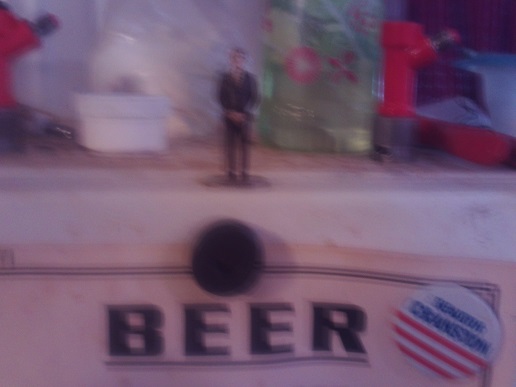brewbama
Well-Known Member
- Joined
- Sep 20, 2013
- Messages
- 3,802
- Reaction score
- 2,829
I chose not to renew my membership a few years ago for several reasons. I know many here won’t agree and that’s OK. I’m not mad at the AHA or anyone that disagrees. In fact I post on their forum often. I just chose to walk from membership and here’s why:
1. The BA is a trade group (aka political lobby). AHA falls under that umbrella as an advocate for the HomeBrew community. One of the advantages of the 501(c)(6) tax status is that it allows organizations to engage in unlimited amounts of lobbying. I don’t want or need to be a member of a political lobby. I likewise am not a member of the Army Aviation Association of America, the Association of the United States Army (or AARP ) for the same reason.
) for the same reason.
2. They don’t follow their own by-laws. Members are supposed to be aware of what happens at meetings thru published minutes. After bringing this to mgmt attention, instead of using the opportunity to communicate with their members to demonstrate the actions they are taking on their behalf, they grudgingly published minutes that were a useless outline as zero source of information. Once. They haven’t published minutes before or after that one useless time.
3. The Governing Committee is powerless. Members are made to feel as if they are voting for representation in meetings where decisions are made and issues resolved. From the clarification they issued, that is a misunderstanding.
4. Conference presentations are a sales event. That’s OK as long as that’s what you’re looking for. While it’s true some presentations are given by enthusiastic homebrewers not trying to sell something, many more are simply selling the latest book, software, product, etc. The best presentations IMO are from those not selling something and are trying to pass good information for the good of the community.
5. Likewise, Zymurgy is a series of advertisements with a few beer articles thrown in between, along with lists of competition winners or upcoming events that require membership. After asked for recommendations for improvement, I suggested a Consumer Reports-style or America Test Kitchen-style equipment comparison series in order to help members navigate the pros and cons of similar pieces of equipment. I was told they can’t do that because they may offend advertisers if their equipment doesn’t come out on top. Advertisers pay the bills. I understand you can’t publish a magazine without cash but are they here for members or advertisers?
6. If clubs and competitions didn’t require members to also be a member of AHA, I imagine the membership roles would be much much smaller. If you truly want to know who is the best home brewer, or want local home brewers to join your club, why limit membership to AHA members? I get it, membership numbers sell lobby influence. But if I don’t want to be a member of AHA I can’t be a member of a local club? Weird.
7. Despite having ~25% of membership by the published AHA demographics map, the in-person conference hasn’t been held in the South for more than a decade. They tried Nashville after a decade but COVID canceled it. NE, N, PNW, and W are well represented in past and future conferences. FLA was over a decade ago. Reasoning has been the various laws that prohibit the event. I thought this was a lobby organization. So, lobby to get the laws changed or a variance to allow the event.
…just my thoughts.
1. The BA is a trade group (aka political lobby). AHA falls under that umbrella as an advocate for the HomeBrew community. One of the advantages of the 501(c)(6) tax status is that it allows organizations to engage in unlimited amounts of lobbying. I don’t want or need to be a member of a political lobby. I likewise am not a member of the Army Aviation Association of America, the Association of the United States Army (or AARP
2. They don’t follow their own by-laws. Members are supposed to be aware of what happens at meetings thru published minutes. After bringing this to mgmt attention, instead of using the opportunity to communicate with their members to demonstrate the actions they are taking on their behalf, they grudgingly published minutes that were a useless outline as zero source of information. Once. They haven’t published minutes before or after that one useless time.
3. The Governing Committee is powerless. Members are made to feel as if they are voting for representation in meetings where decisions are made and issues resolved. From the clarification they issued, that is a misunderstanding.
4. Conference presentations are a sales event. That’s OK as long as that’s what you’re looking for. While it’s true some presentations are given by enthusiastic homebrewers not trying to sell something, many more are simply selling the latest book, software, product, etc. The best presentations IMO are from those not selling something and are trying to pass good information for the good of the community.
5. Likewise, Zymurgy is a series of advertisements with a few beer articles thrown in between, along with lists of competition winners or upcoming events that require membership. After asked for recommendations for improvement, I suggested a Consumer Reports-style or America Test Kitchen-style equipment comparison series in order to help members navigate the pros and cons of similar pieces of equipment. I was told they can’t do that because they may offend advertisers if their equipment doesn’t come out on top. Advertisers pay the bills. I understand you can’t publish a magazine without cash but are they here for members or advertisers?
6. If clubs and competitions didn’t require members to also be a member of AHA, I imagine the membership roles would be much much smaller. If you truly want to know who is the best home brewer, or want local home brewers to join your club, why limit membership to AHA members? I get it, membership numbers sell lobby influence. But if I don’t want to be a member of AHA I can’t be a member of a local club? Weird.
7. Despite having ~25% of membership by the published AHA demographics map, the in-person conference hasn’t been held in the South for more than a decade. They tried Nashville after a decade but COVID canceled it. NE, N, PNW, and W are well represented in past and future conferences. FLA was over a decade ago. Reasoning has been the various laws that prohibit the event. I thought this was a lobby organization. So, lobby to get the laws changed or a variance to allow the event.
…just my thoughts.
Last edited:






































![Craft A Brew - Safale S-04 Dry Yeast - Fermentis - English Ale Dry Yeast - For English and American Ales and Hard Apple Ciders - Ingredients for Home Brewing - Beer Making Supplies - [1 Pack]](https://m.media-amazon.com/images/I/41fVGNh6JfL._SL500_.jpg)






















